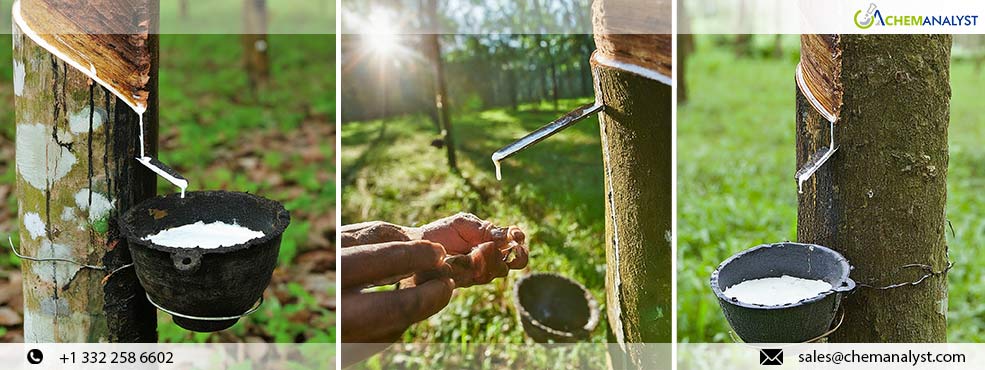Welcome To ChemAnalyst

Laem Chabang, Thailand: In March 2024, the prices of Natural Rubber (TSR) witnessed an incline in their trend due to the supply shortage of the commodity, therefore, the heightened demand from the downstream Automotive and Tire sectors was not fulfilled and resulted in the price hike of the commodity. However, Thailand followed a downward trend due to the weak support from the raw material, Latex. Therefore, the supply chain of Natural Rubber (TSR) was hampered and resulted in a declining price trend for the commodity.
In the Asian market, Thailand showcased a downward price trend of Natural Rubber (TSR) and settled at USD 1580/MT (FOB-Laem Chabang) as several regions in Thailand that produce raw materials have halted operations, nearing a shutdown phase. This has led to a decreasing supply in the market, although the high prices of raw materials have somewhat declined, offering limited support to the Natural Rubber (TSR) market. Consequently, the Natural Rubber (TSR) market in Thailand experienced a downward trend this month. Moreover, Thailand's subdued economic performance following a slowdown in growth in 2023 is prompting the Bank of Thailand (BOT) to reconsider its neutral interest rate stance. Strong trade flows of Natural Rubber (TSR) from Thailand to overseas markets have been observed, driven by heightened demand from international downstream automotive and tire sectors. Additionally, production levels were lower than usual due to extreme temperatures experienced recently, with expectations that figures would reach 850,000 tonnes by the end of the current fiscal period. However, despite sufficient raw materials, latex prices decreased as a result of anticipated shutdown periods, contributing to a decline in commodity prices.
However, Indonesia followed an upward trend in March 2024, as the disruption in the supply chain of Natural Rubber (TSR), caused by devastating flash floods and landslides following torrential rains in West Sumatra in early March 2023, led to a 2% increase in Natural Rubber TSR prices. This event marked one of Indonesia's latest deadly natural disasters. While government officials attributed the floods to heavy rainfall, environmental groups pointed to deforestation and environmental degradation as exacerbating factors intensifying the impact of severe weather across the country. Consequently, both domestic and overseas markets experienced disturbances in Natural Rubber (TSR) supplies, resulting in tightened supplies and subsequent price hikes for the commodity.
Similarly, in the US market, The Automotive sector's demand for Natural Rubber TSR-20 surpassed available inventories, leading to increased trading activities from the Indonesian market to the US market, however, due to torrential weather, the supply chain was hampered because of the flood. In terms of the downstream sectors, the heightened demand for Natural Rubber (TSR) from the downstream Automotive and Tire sectors led to a faster consumption rate of existing inventory levels, resulting in a decrease in available inventories. In the U.S., despite high-interest rates, new vehicle sales experienced a notable surge of 5.1% from January through March, indicating sustained buyer interest in the market. However, the growth of electric vehicle (EV) sales slowed down during the first three months of the year. Mainstream buyers voiced concerns about limited range and a shortage of charging stations, which contributed to the deceleration in EV sales growth. Sales of EVs increased by only 3.3% to nearly 270,000 units during the quarter, marking a significant decrease from the 47% growth observed last year. This slowdown, particularly attributed to Tesla, highlights automakers' concerns that they may have rushed too quickly to attract EV buyers. Consequently, the EV share of total U.S. sales declined to 7.15% in the first quarter.
In the German market, the increased demand for Natural Rubber (TSR) from the downstream Automotive and Tire sectors outpaced existing inventory levels, prompting intensified trading activities from the Malaysian and Indonesian markets to the German markets. However, these efforts for trading for Natural Rubber (TSR) were hampered by ongoing crises. Europe's largest economy saw a total of 263,844 new cars hitting the roads this month, according to the KBA federal transport authority, representing a 6.2% decrease compared to the previous year. This decline could be partially attributed to fewer working days compared to March 2023. Demand for electric cars remained very weak, despite significant discounts offered by many manufacturers to offset the cancellation of environmental bonuses. Fully electric vehicles accounted for just 11.9% of all car registrations in March, down from 15.7% a year ago.
According to ChemAnalyst, the prices of Natural Rubber (TSR) are anticipated to incline in the upcoming weeks due to the expected shutdown in the production activity in the major exporting nation, Thailand. Therefore, the prices of Natural Rubber (TSR) could inclined due to the supply shortage of the commodity in the market.
We use cookies to deliver the best possible experience on our website. To learn more, visit our Privacy Policy. By continuing to use this site or by closing this box, you consent to our use of cookies. More info.
